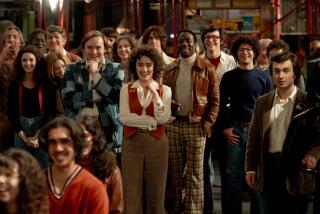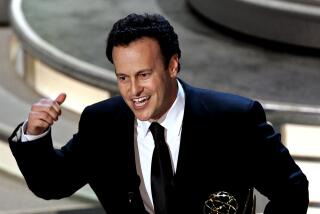No ‘Curb’ on quirks
- Share via
Reunions are difficult things. Whatever joy there is to be had in reclaiming the past from the dustbin of history, these monuments to elapsed time inevitably carry the faint, acrid odor of mortality. Which makes Larry David’s “Curb Your Enthusiasm,” with its Greek-tragicomic aura of inescapable fate -- that is usually to say, of failure -- the perfect venue in which to stage a “Seinfeld” reunion. It’s the only venue, really, and one that does not infect the occasion -- which is actually kind of thrilling -- with an air of confetti-ed celebration the original had no time for.
“These reunion shows, they’re so lame, really, they never work,” said Larry David -- that is, the Larry David-like character, henceforth called “Larry,” that Larry David, henceforth called “David,” plays on “Curb Your Enthusiasm” -- on last Sunday’s episode, the third of the series’ seventh season and the beginning of the “reunion arc.” “The actors are 10 years older; it doesn’t look right.”
It was the first of several disclaimers meant to signal that everyone involved knows as well as you do that most reunions fail -- they fail to recapture past glories, or to escape them and move forward in any satisfying way. But this is a reunion once removed, set not in a three-walled New York apartment but in the parallel single-camera universe that is “Curb Your Enthusiasm” and in the Hollywood where “Seinfeld” transpired; it brings back the cast but only secondarily its characters. (It remains to be seen how much we will actually get of George Costanza, Cosmo Kramer, Elaine Benes and the sitcom’s titular Jerry Seinfeld.)
It does not need to be good “Seinfeld” to succeed, just good “Curb Your Enthusiasm.” In fact, it can be terrible “Seinfeld” and still be good “Curb” -- that the reunion will somehow go wrong is to be expected -- and “Curb Your Enthusiasm” is something that David knows how to make. The show, which began in 2000, or 1999 if you count the mockumentary special that shares its name, has been on television about as long as “Seinfeld” was, though with many fewer episodes produced -- indeed, it skipped 2008 entirely.
Additionally, this Television Event is taking place not upon the wide, public expanses of NBC -- whose fictional counterpart is set to fictionally broadcast the fictional reunion within the actual reunion -- but under the somewhat protective cover of a premium cable channel, with its looser rules and smaller, paying audience. Sunday’s show, which put Seinfeld, Jason Alexander, Julia Louis-Dreyfus and Michael Richards into the same camera frame for the first time since 1998, attracted 2.3 million viewers, or about 1/30th the 76 million who watched the final “Seinfeld” in 1998.
“Every time you see one of those reunion shows, it feels like they’re doing it for the wrong reason,” Dreyfus told Larry on Sunday’s episode.
Given the huge pots of cash the actors took home weekly from “Seinfeld,” and not even counting the pin money they continue to earn from its syndication, there is no reason for them to be here -- within and without the context of the show -- except that it might be fun, and it might be good. (Larry’s typically self-serving motivation is to get back ex-wife Cheryl Hines by giving her a part in the reunion show.) And there is Alexander’s observation to Larry that, if nothing else, “it could make up for the finale.”
That finale, written by David -- in which his co-creations are put on trial and imprisoned for insufficient empathy -- stands with the black-screen end of “The Sopranos” as one of the least-loved conclusions in the history of television. I can’t recall if the jokes worked, but it was conceptually apt -- a final denial of uplift and warmth and all the approved TV values, a defense of the indefensibility of those characters.
The truth is, there is nowhere to go with them: They are complicated almost beyond endurance, but they are also immutable. (David ended the series with the same dialogue -- about shirt buttons -- that began it.) There is nothing you can wish for them -- marriage? children? money? -- that would not occasion just more nitpicking, breast-beating and circular argument. By the same token, there is nothing you can take away, not even their freedom, that will substantially harm them. Their greatest and possibly only pleasure in life is to be proved right over very small things.
This is true of Larry as well, for in many ways, and not surprisingly, “Curb Your Enthusiasm” is a variation on themes from “Seinfeld.” Both are founded on the professional comedian’s obsessive sense of cognitive dissonance: “What’s up with that?” And as ever, answer comes there none.
--
--
‘Curb Your Enthusiasm’
Where: HBO
When: 9 p.m. Sunday
Rating: TV-MA (may be unsuitable for children under the age of 17)
More to Read
The complete guide to home viewing
Get Screen Gab for everything about the TV shows and streaming movies everyone’s talking about.
You may occasionally receive promotional content from the Los Angeles Times.







